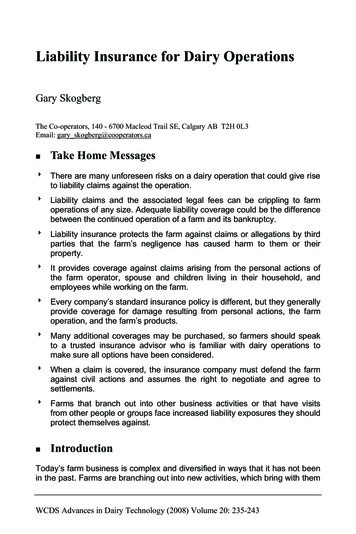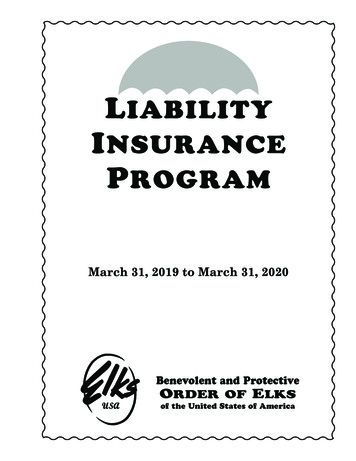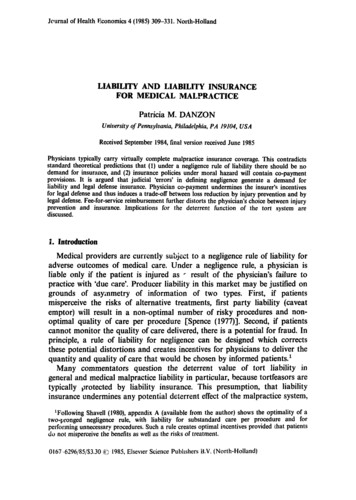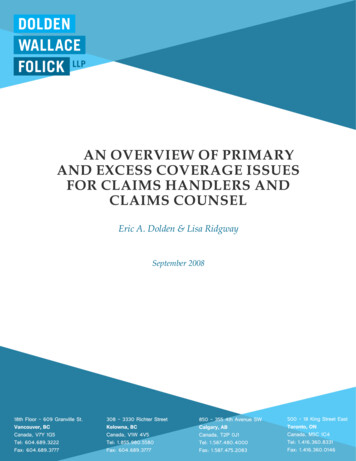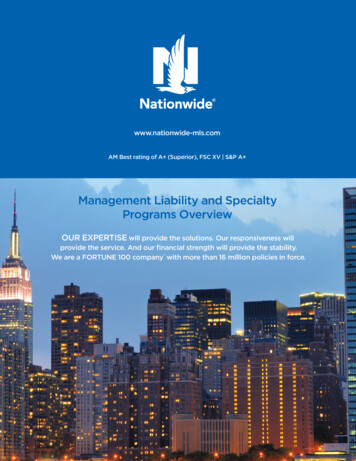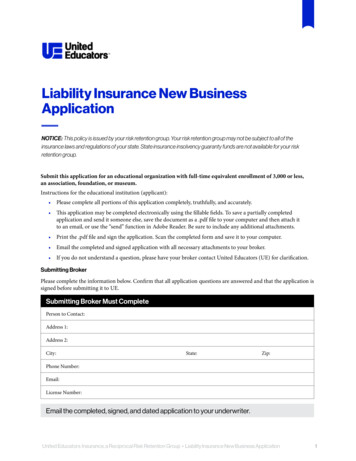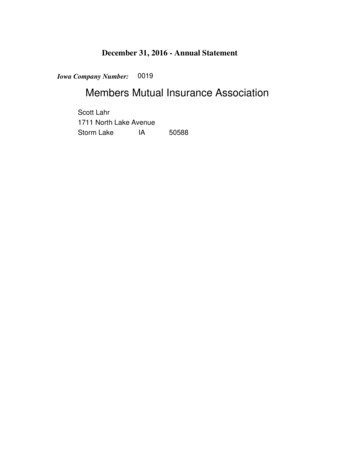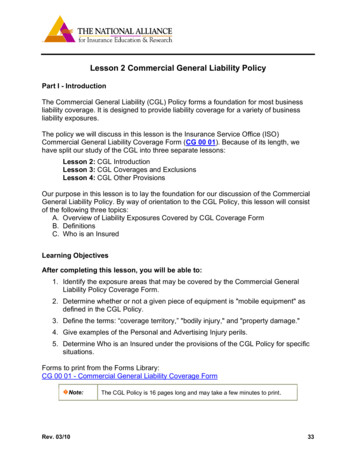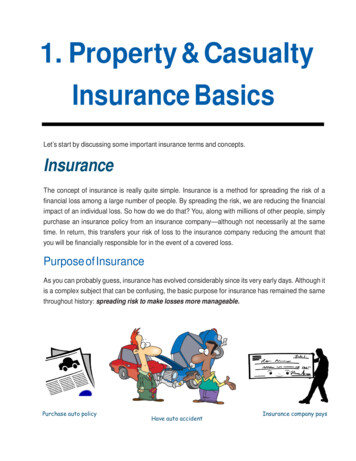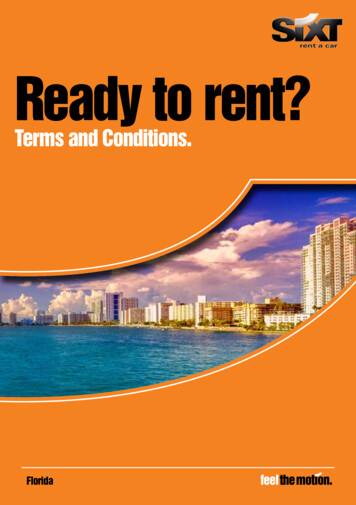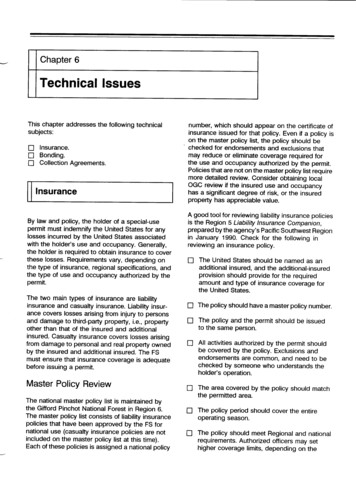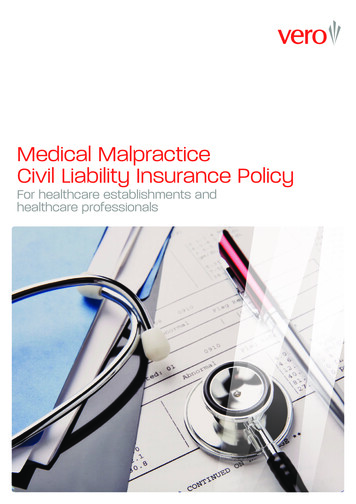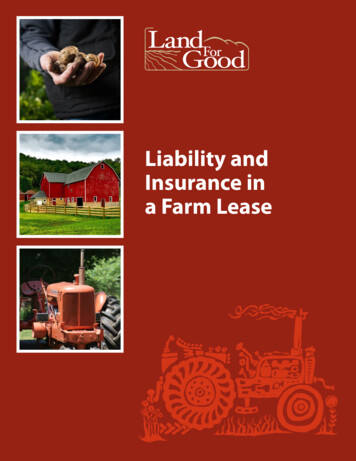
Transcription
L I A B I L I T Y A N D I N S U R A N C E I N A FA R M L E A S ELiability andInsurance ina Farm Leasei
Liability and Insurancein a Farm LeaseA Guide for Landowners and TenantsMike Ghia, Land for GoodThanks to Carl Wyman of Wyman Insurance Agency,Weathersfield, VT for his contributions to this guide. 2018 Land for Good, Inc.P.O. Box 625 39 Central Square, Suite 306, Keene, NH 03431603.357.1600 info@landforgood.orgwww.landforgood.orgThis guide does not constitute insurance advice for individuals.Consult with your insurance professionals and legal counsel foradvice concerning your particular situation.
L I A B I L I T Y A N D I N S U R A N C E I N A FA R M L E A S ERISK, LIABILITY AND INSURANCEWhen leasing property for farming, both landownersand tenants often worry about liability andproperty damage. While they are prudent to havethis concern, both the landowner and tenantfarmer should take comfort to know that thereare established mechanisms to minimize riskand to protect both farm property owners andfarming tenants. These concerns should not be animpediment to landowners and farmers enteringinto lease agreements.Insurance is a useful tool to address other concernsin addition to liability. Typically, one or more types ofinsurance coverage is carried by both the landownerand the tenant farmer. This guide will cover varioustypes of insurance recommended for considerationby landowners and their tenants.While a certain amount of risk is inherent in owningproperty and in farming it, both parties can—andshould—take steps to mitigate risk. Parties shouldassess risks, identify strategies to mitigate them anddevelop an action plan. In the insurance industry,insured parties are obligated to take “reasonablecare”—suitable precautions to avoid risk. Forexample, farming tenants are demonstratingreasonable care by making sure that the farm isa safe place for customers such as having a welldesigned parking area and taking steps to keepwandering children from getting hurt by livestockor equipment. Landowners who have electricalwiring inspected or who fix a structural problem ina barn used by the tenant are also demonstratingreasonable care. Negligence is defined as thefailure to exercise the reasonable care that areasonably prudent person would exercise in a givencircumstance.General risk mitigation approaches includeavoidance, limitation, and transfer. Avoidance meansjust that: don’t engage in a risky endeavor. Limitationmeans reducing your exposure to the risk(s). Transfermeans shifting the burden of the risk(s) to another.In the case of a farm lease, responsible practicesand diligent maintenance will go a long waytoward avoiding and limiting adverse occurrences.Transferring risk is mainly done through the use ofinsurance.This guide discusses several types of insurancerelevant to farm lease arrangements. Therequirements for—and interests of—bothlandowners and farmers are discussed. Farmers mayneed additional types of insurance coverage notaddressed here for their own business purposes,such as product liability and crop insurance.1. L I A B I L I T YFarmer’s Liability Insurance, Covering theLandownerA typical standard homeowner’s insurance policywill NOT cover commercial farming activities onthe property of a private landowner. One way forthe landowner to obtain liability protection is torequire the tenant farmer to carry his or her ownfarm liability insurance, naming the landowner asan “additional insured.” The landowner should requireproof of such coverage, usually via a Certificate ofInsurance from the tenant’s farm insurance agentspecifying the location and description of theinsured property. If there are multiple propertiesinvolved, each of these should be named in thepolicy. This should be a requirement in any farmlease. The landowner muststill keep his or her ownhomeowner’s insuranceBoth parties cancoverage, or carry a farmliability policy as describedtake steps toin the next section below.mitigate risk.By naming the landowneron the tenant farmer’sliability insurance policy,the farmer is essentially sharing his or her insurancewith the property owner. In addition, when thelandowner is named as an additional insured on thefarmer’s insurance, the landowner will be notified1
L I A B I L I T Y A N D I N S U R A N C E I N A FA R M L E A S Edirectly by the insurance company if there is anon-payment of premiums or if the insurance isterminated and no longer in force.Both the landowner and the tenant should consulttheir respective insurance agents to determinethe appropriate levels of liability insurance. At thetime of this publication, a common level requiredis a minimum of 1,000,000 per occurrence and 2,000,000 aggregate coverage.It is acceptable for the property owners to askfor a copy of the actual farm liability policy. Bothlandowners and farmer tenants should make surethat they understand what is covered and notcovered. The definition of farming for insurancepurposes is generally limited to the raising of cropsand farm animals. When relevant, it is importantto make sure that the farmer’s insurance policyalso covers other activities on the farm that are notdirectly covered under the definition of farming.These might include production of value-addedproducts, food processing, agri-tourism and directmarketing ventures such as a farm stand. If suchactivities will take place on the leased property,and are not covered by farm liability policy, thenthe farmer should be required to obtain additionalcoverage for them. In some cases, the farmer canpurchase additional farm business coverage as apart of their farm liability policy to address this issue.In other cases, the farmer may need to purchase aseparate commercial liability policy that covers thesespecific activities. With a commercial liability policy,the tenant farmer should also name the propertyowner as an additional insured.Landowner’s Liability InsuranceIn many cases, the landowner is consideredadequately insured for liability by being named asadditional insured on the farmer’s liability policy,provided that the landowner also maintains his orher standard homeowner policy. However, someinsurance agents feel that in certain circumstancesit is important that property owners also maintaintheir own separate farm liability coverage in additionto being named on the farmer’s liability policy.Both parties maintaining this coverage provides forbroader coverage, and increases the dollar amountof the coverage available in the event of a claim sincethe parties are not sharing one limit for coverage.There are generally three ways landowners canobtain this coverage:1. In some cases, itmay be possible toadd an “incidentalUnderstand what’sfarm and animalliability endorsement”covered in ato the landowner’sliability policy.standard homeownerpolicy by request,and at a (usuallysmall) additional cost. This is usually the least-costoption. However, these endorsements are notoften available, and still may not address all of thelandowner’s liability protection needs. If this optionis available, the landowner should discuss thisendorsement with the insurance agent to clearlyunderstand what this rider will and will not cover.2. Property owners may replace their homeowner’sinsurance policy with their own farm liability policy.This option would particularly make sense if thelandowner is either partnering with the tenantfarmer in some way, or decides to engage in his orher own farming enterprise.3. The landowner keeps his or her homeowner policybut then adds a commercial liability policy whichcovers “lessor’s risk.” This is also known as landlordliability insurance.Property owners should consult with their insuranceagent, and possibly their attorney, to determineif they should have coverage in addition to beingnamed additional insured by the farmer tenant and,if so, which approach makes the most sense for hisor her circumstances. If the property owner doesincur an increase in his or her insurance as a result ofengaging in a farm lease, he or she might considerfactoring this additional cost into the lease fee paid2
L I A B I L I T Y A N D I N S U R A N C E I N A FA R M L E A S Eby the farmer. There are also special considerationsif a residence is included as a part of the farm rental.This is discussed in Section 7 below.2. A U T O M O B I L E L I A B I L I T YIt is also often recommended that the farmer’s policyincludes an endorsement for “hired and non-ownedvehicles”. This endorsement would cover liability foractions related to rented or borrowed automobiles orthe automobiles of employees or venders. This wouldalso cover the farmer’s personal vehicles which arenot owned by the farm business, for instance a pickup truck registered to the individual rather than tothe business. This coverage is relatively inexpensive,but not standard in a farm policy, and needs to berequested.If the tenant has commercial vehicles owned by thefarm business, the tenantfarmer should also carrycommercial automobileliability coverage in theirCoverage forfarm liability policy. Thisborrowedcoverage will provideequipmentliability protection inthe case that there is anmight makeaccident related to thesense.farmer’s commercialvehicle(s) while in use onthe farm property, andusually also elsewhere.3. B O R R O W E D O R H I R E D E Q U I P M E N TB E LO N G I N G T O T H E P R O P E R T YOWNERIf the farmer-tenant will be borrowing or leasingequipment from the property owner, the farmershould carry coverage for “hired or borrowedequipment” in his or her farm policy, and theproperty owner should consider requiring this inthe lease. This provides coverage for damage to theequipment itself and is not related to liability. Thelevel of coverage will be based on the value andamount of equipment to be covered. This type ofcoverage is relatively inexpensive, but not standardon a farm policy. It must be requested. In caseswhere the use of equipment will be more thanincidental and over extended periods of time, itsometimes is recommended that the tenant includethe specific leased equipment directly on his or herfarm insurance policy for property loss and casualtyinstead of, or in addition to, having the “hired orborrowed equipment” endorsement.4. P O L LU T I O N A N D E N V I R O N M E N TA LLIABILITYBasic coverage for pollution and environmentalliability is generally included in standard farm liabilitypolicies. However, it is usually limited in scope, andthe policy is likely to include specific exclusions.While additional pollution and environmentalliability is available, it can be extremely expensive.Generally, most farmers do not carry this additionalcoverage, and it usually is not necessary. However,both the landowner and tenant should discussthis issue with their respective farm insuranceagents within the context of the type of farmingby the tenant and the coverage available underthat farmer’s general farm liability policy. It is quitepossible that the coverage in the general farmliability policy will be sufficient, and no additionalinsurance will be required.5. P R O P E R T Y LO S S A N D D A M A G EAs with liability insurance, a standard homeownerpolicy will not cover for property loss from fire orother damages to buildings on the farm propertywhile commercial farming activity takes place on it.There are two options to remedy this:In the first option, the property owner changes3
L I A B I L I T Y A N D I N S U R A N C E I N A FA R M L E A S Efrom a standard homeowner policy to a farm ownerpolicy AND requires the tenant farmer to carryfire-legal liability insurance in case of fire or otherdamages to farm property. The tenant must alsoname the property owner as an additional insuredon that policy, which will cover damages only ifthe farmer is found to be negligent and, therefore,legally responsible for a fire or other damages to theproperty. In the event of property loss due to othersources not related to the farmer’s negligence, suchas electrical wires, lightening, snow load or flooding,it will be the property owner’s farm owner policy thatwill cover these losses.The fire-legal liability insurance in case of damageto farm property is relatively inexpensive. Farmowner policies premiums vary. In some cases, theyare actually lesscost than somehomeownerA standardpolicies.homeowner policyHowever, inother cases,may not coverfarm ownerproperty loss on a farmpolicies may beas much as 30property.percent higherthan a standardhomeownerpolicy. If the property owner incurs an increasein his or her insurance as a result of engaging ina farm lease, he or she might consider factoringthis additional cost into the lease fee paid by thefarmer. Most general insurance carriers stay awayfrom farm owner insurance policies. However, thereare a number of insurance companies in the regionthat specialize in farming and agriculture. A list ofthose companies can be found at the end of thisdocument.The second option requires the farmer to includeproperty loss insurance on his or her farm policy andto name the property owner as an additional insuredand “loss payee” on the farm policy. In this case, theproperty owner would need to continue to carry hisor her standard homeowner policy, but the farmerwould NOT need to carry the additional fire-legalliability insurance in case of fire damage to farmproperty because the farmer would be providinginsurance through their farm policy.The latter of these options is the least expensiveapproach. However, there are reasons why aproperty owner would choose the first approach,such as if he or she also decides to become involvedin commercial farming activities. Ultimately theseoptions should be discussed with an insuranceprofessional within the context of the particular leaseto decide which option will be best for that situation.In either scenario, it is important that both theproperty owner and the tenant farmer understandwhat hazards, or “peril groups” beyond fire damageare covered, and under what circumstance coveragewould apply. For instance, not all policies will coverwind damage under all circumstance, and most donot cover flooding. Whether property loss is coveredby the insurance of the tenant or of the propertyowner, the property owner should make sure thatthey are aware of what “peril groups” are coveredand that the insurance adequately protects theirproperty.When Property Loss Affects the Ability of theFarm Business to FunctionThe farm lease should specify what happens ifproperty damage prevents or significantly limitsthe tenant from carrying on his or her business.And specifically, the lease should state whether thelandowner is required to use the insurance proceedsto repair or rebuild buildings and infrastructure thatis essential to the farming operation and in whattime frame. Otherwise, it can’t be assumed that thelandowner will rebuild, and the tenant may needto be released from the lease if they are no longerable to continue to carry out their business on theproperty.Levels of Property Loss InsuranceIf the farmer will carry the property loss insurance4
L I A B I L I T Y A N D I N S U R A N C E I N A FA R M L E A S Eon the leased farm, there should be an agreementbetween the property owner and the farmerregarding the level of coverage to be carried,specifically on the farm buildings to ensure that itis adequate. For instance, the replacement cost ofan antique barn may be substantially different fromthe cost of rebuilding a barn that would serve thesame utility purpose. It will be important to consultwith insurance professionals to determine the mostappropriate level of coverage. For a discussion ofcoverage levels, see “How Much Property InsuranceShould I Buy?” from “Insuring Your Farm TheBasics of Property & Liability Coverage” from theMaine Bureau of Insurance umer guides/pdf/insuring your farm.pdf ).6. W O R K E R S ’ C O M P E N S AT I O NIf the farmer has employees, including interns, he orshe is required by state law to carry a certain levelof workers’ compensation insurance. These lawsalso specify the difference between an employeeand a contractor. If there is an accident on thefarm involving a farm employee and he or shetakes legal action for compensation against thefarmer, the farm liability policy will not cover thefarmer if he or she has not provided for workers’compensation insurance to the level required bystate law. Therefore, many farm leases will includea requirement that the farmer carry workers’compensation “at least to the minimum limitsimposed” by the state where the farm is locatedto reduce the risk of an injured employee seekingcompensation from the landowner when it isunavailable from the farmer.7. L E A S I N G A R E S I D E N C EWhen the farm lease includes a residence used bythe farmer, the following applies:ÝÝ When the farmer is naming the property owneron the farm general liability policy as describedabove, the property owner still needs to carrya standard homeowner policy, but generallydoes not need to carry additional lessor liabilityinsurance. However, the property ownergenerally needs to carry additional property lossinsurance on the residence, since the standardhomeowner policy will not cover commercial useof the building (i.e. rental).ÝÝ If the property owner has a farm owner policyinstead of a homeowner policy, the propertyowner will typically need additional lessor liabilityinsurance and property loss insurance for theresidence, even when the farmer has named theproperty owner on his or her farm policy.ÝÝ The farm propertyloss insurance ofthe tenant may onlycover their businessproperty and notpersonal propertyin the residence.The tenant maydesire to purchaseadditional “renter’sinsurance” to covertheir personalproperty.There areadvantages tothe landlord andtenant having thesame insurancecompany.When the PropertyOwner and Farmer have the same InsuranceCompanyThere is a substantial advantage to both the propertyowner and the farmer having the same insurancecompany, since in the event of a claim, there willbe no dispute over which insurance company isresponsible for paying the claim. Further, if the sameagent is involved with determining the insurancefor both parties, the agent will be responsible formaking sure that all insurance issues are covered andaddressed by either one party or the other. In theory,this makes it less likely that some coverage issues willbe missed.5
L I A B I L I T Y A N D I N S U R A N C E I N A FA R M L E A S EN E W E N G L A N D FA R M I N S U R A N C E C O M PA N I E SThe following insurance carriers specialize in agriculture and farminsurance in our region. Each company has a website with a “findan agent” tab to direct you to an insurance agent in your area. In noparticular order, these 6 insurance carriers are:ÝÝ Farm Family Insurance (New England wide)https://www.farmfamily.com/ÝÝ Co-Operative Insurance (Vermont and New Hampshire only)https://www.co-opinsurance.com/ÝÝ Maine Mutual Group-MMG (New England wide)https://www.mmgins.com/ÝÝ Nationwide Agribusiness (New England ess/ÝÝ Acadia (New England wide)https://www.acadiainsurance.com/ÝÝ Countryway Insurance (New England wide except Rhode Island)https://www.countryway.com/6
Insurance from the tenant's farm insurance agent specifying the location and description of the insured property. If there are multiple properties involved, each of these should be named in the policy. This should be a requirement in any farm lease. The landowner must still keep his or her own homeowner's insurance coverage, or carry a farm
